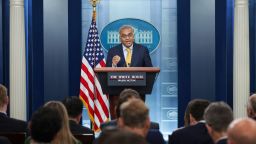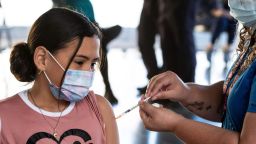Moderna’s Covid-19 vaccine is safe and generated an immune response in children ages 6 months through 17 years that’s comparable to the response in adults, according to documents posted by the US Food and Drug Administration ahead of key meetings of its independent vaccine advisory group.
The FDA’s vaccine advisers will evaluate next week Moderna’s Covid-19 vaccines for children 6 months through 5 years and 6 years through 17 years should be granted emergency use authorization.
Children under 5 years old – about 18 million people – are the only US age group that still isn’t eligible to receive a Covid-19 vaccine. Moderna’s vaccine is currently available only to people 18 and older. Pfizer’s Covid-19 vaccine is already authorized for children age 5 and older; FDA’s advisers will also evaluate its vaccine for younger children next week.
Briefing documents posted ahead of the FDA committee meetings describe how Moderna’s vaccine was assessed by immunobridging studies to see if the immune response among younger people was comparable to that of 18-to-25-year-olds, who are already eligible to receive the vaccine.
“Immunobridging success criteria were met for all four pediatric age cohorts,” the FDA’s document stated.
In trials evaluating more than 6,000 children 6 months to under 6 years old, Moderna found two 25-microgram doses of vaccine taken 28 days apart yielded a similar immune response to a two-dose series of vaccine given to18-to-25-year-olds.
For children ages 6 to 17 years, Moderna found two doses of its vaccine also provided a similar immune response as two doses in adults. Children age 6 to 11 received 50-microgram vaccines and adolescents ages 12 to 17 received 100-microgram vaccines.
Efficacy estimates
The vaccine trials took place at different times, when different coronavirus variants circulated. While the FDA did not require vaccine makers to submit vaccine efficacy data for authorization, Moderna’s vaccine was estimated to be 93.3% effective against symptomatic disease for 12-to-17-year-olds during a time when the original coronavirus and the Alpha variant were dominant. The vaccine was estimated to be 76.8% effective against symptomatic Covid-19 for children 6 to 11 during a time the Delta variant was predominant. However, the FDA also noted for 6-11-year-olds the “vaccine efficacy could not be reliably determined due to the small number of COVID-19 cases accrued during the study.”
The vaccine was tested in children 6 months through 5 years during a time when the Omicron variant was dominant. It was estimated to be 36.8% effective against symptomatic disease for 2-to-5-year-olds and 50.6% protective against symptomatic disease for those 6-to-23 months old.
Vaccine efficacy estimates “for each age cohort were generally consistent” with what has been seen in adults, the FDA said.
Vaccine safety
The vaccine was also found to be safe in all age groups. Adverse reactions were “mostly mild to moderate in severity, generally of short duration, and occurred more frequently … after Dose 2 than Dose 1.”
Injection site pain was the most commonly reported adverse reaction and the document said serious adverse events were infrequent and didn’t raise any concerns. No deaths were reported.
While there were no known cases of myocarditis or pedicarditis – inflammation of the heart – among any trial participants, it’s one of the known risks with the Moderna Covid-19 vaccine, especially among males 18-to-24 years old.
What’s next for Moderna’s vaccine
Get CNN Health's weekly newsletter
Sign up here to get The Results Are In with Dr. Sanjay Gupta every Tuesday from the CNN Health team.
The FDA’s Vaccine and Related Biological Products Advisory Committee Meeting will evaluate Moderna’s Covid-19 vaccines for children ages 6 through 17 on June 14 and will evaluate Moderna’s Covid-19 vaccines for children 6 months through 5 years of age on June 15.
Pfizer’s Covid-19 vaccine for children under 5 will also be discussed on June 15.
After the FDA vaccine advisers vote, the agency must decide whether to authorize the vaccines. Shots cannot be administered until US Centers for Disease Control and Prevention’s vaccine advisers have voted whether to recommend the vaccines and the CDC director has signed off on the recommendation. The White House has said vaccines for the youngest age group could be administered starting the week of June 20.






